High School to Workforce

High School to Workforce
What an exciting time! You have graduated high school and now are looking for a job. Or maybe you have already secured a post-graduation position. Whatever the case, it is time for you to take over as your food allergy advocate. Below you will find things you need to consider when heading into the workforce as an adult.
If you check off anything on this page, this is the one thing that is a MUST-DO:
Always carry two epinephrine auto-injectors on your person! No excuses!
Even if you need to strap them to your ankle or carry them in a cross-body bag, you must ALWAYS carry your rescue medications with you, whether or not you plan to eat or drink something. They are called life-saving medications for a good reason.

Housing
Decide what is right for you. Some young adults prefer to continue to live with their parents after high school graduation (a great way to save money!) while others prefer to strike off on their own and get an apartment or house. If you plan to share an apartment or house with someone, you will have more to consider regarding safety.
Before you start the process of interviewing roommates, it’s important to talk to your board-certified allergist about whether you need allergens to be kept completely out of the home or if it’s okay for your roommate to have them, as long as foods are clearly labeled or your roommate takes other precautions to keep allergens separate from your food and personal items.
Topics to consider:
- Are roommates willing to not keep allergens in the house or keep them in their own room?
- Will your roommates agree not to share your cookware?
- How will you handle appliances? Is it safe for you to share a refrigerator and microwave with someone who may be preparing foods with allergens?
- Is the apartment/house smoke-free if you have asthma?
- Will your roommates learn to use an epinephrine auto-injector to help you in an emergency?
- Will they make sure their friends don’t bring allergens into the house when you are not there?
- Will they agree to not share silverware/mugs with you (or be willing to be diligent about cleaning shared items)?
- Is there a hospital within a reasonable driving distance from where you are going to live?
Read FAACT's Shared Living Spaces section and the Shopping, Cooking, and Eating with Food Allergies section for much more detail on issues to consider with roommates and food allergies.
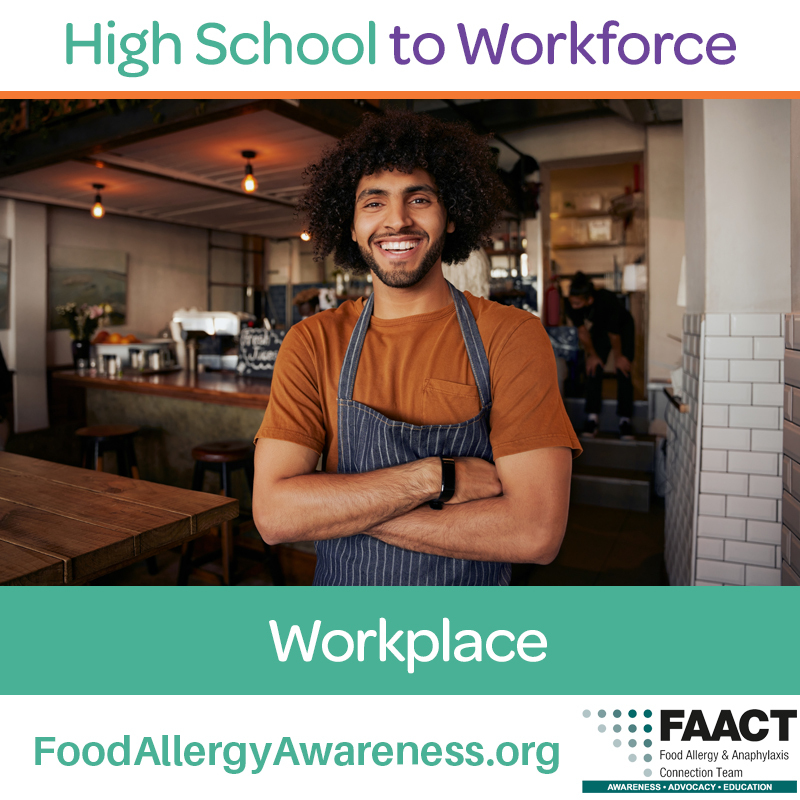
Workplace
- Alert your immediate supervisor of your food allergies upon hire.
- Alert your coworkers as well.
- Establish a game plan for shared spaces. At work, your colleagues may eat at their desk or in a shared cafeteria/break room.
- Will your coworkers agree not to eat your allergen around you?
- Can a safe eating place be established at your place of work?
- Check out FAACT’s Adults with Food Allergies section for tips on managing:

Dining
- Learn about the local eateries from which your colleagues order lunch.
- A lot of workplaces have certain days of the week they order out lunch as a team. You will want to check ahead to see if this place would be safe for you.
- Find safe restaurants in the area that you can suggest to the group!
If you’re going to work for a large company or government agency, there might be a cafeteria onsite.
- Is there an established protocol for managing food allergies at the cafeteria? If so, review the policies and ask for details:
- How will you request and receive safe meals?
- Confirm your responsibility to secure safe meals.
- Confirm with the cafeteria’s responsibility for serving safe meals.
- Have food service staff received advanced food allergen management training from accredited sources, such as AllerTrain™? NOTE: AllerTrain has partnered with FAACT to offer expert food allergy training and food service protocols. Does the food service have a policy in place for ordering allergen-safe ingredients? Are they able to read labels or confirm ingredient cross-contact risk from the manufacturer?
- Will these practices meet your needs? If not, plan on packing safe foods to eat at work.

Socializing
As you make friends at work, the opportunity to eat a meal together, hang out after work, or go to parties may arise. New friends WANT to know about your food allergies, where rescue meds are stored, and what to do in case of an emergency. Please do not assume that you are a burden; it is the opposite of what you might think.
- Research local restaurants that are safe for you to enjoy with new friends.
- Be ready to let new friends know about your food allergy, where you carry epinephrine auto-injectors, and where you keep your Allergy & Anaphylaxis Emergency Plan (emergency plans should always be with your epinephrine auto-injectors).
- Get comfortable and ready to explain cross-contact, how you stay safe, signs you are having an allergic reaction, and what you need during an allergic reaction.
- Do you have a “sign” if you need epinephrine? (You might be too far away for someone to hear you clearly, and anaphylaxis can make it difficult to speak.) Learn FAACT’s Fist to Thigh “Sign” and share it with your friends!
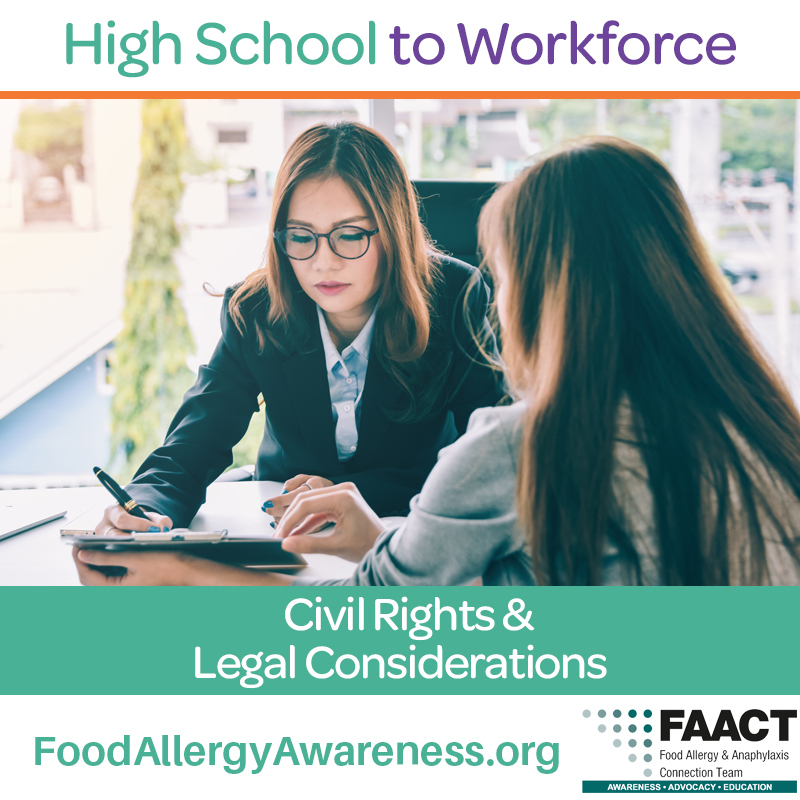
Civil Rights and Legal Considerations
- The U.S. Department of Justice has determined that food allergies are a disability that may be accommodated by workplaces.
- If you had a 504 plan in high school, it can support the need for accommodations in subsequent areas of your life, such as the workplace.
- If you need assistance, contact FAACT's Vice President of Civil Rights Advocacy at: Amelia.Smith@FoodAllergyAwareness.org
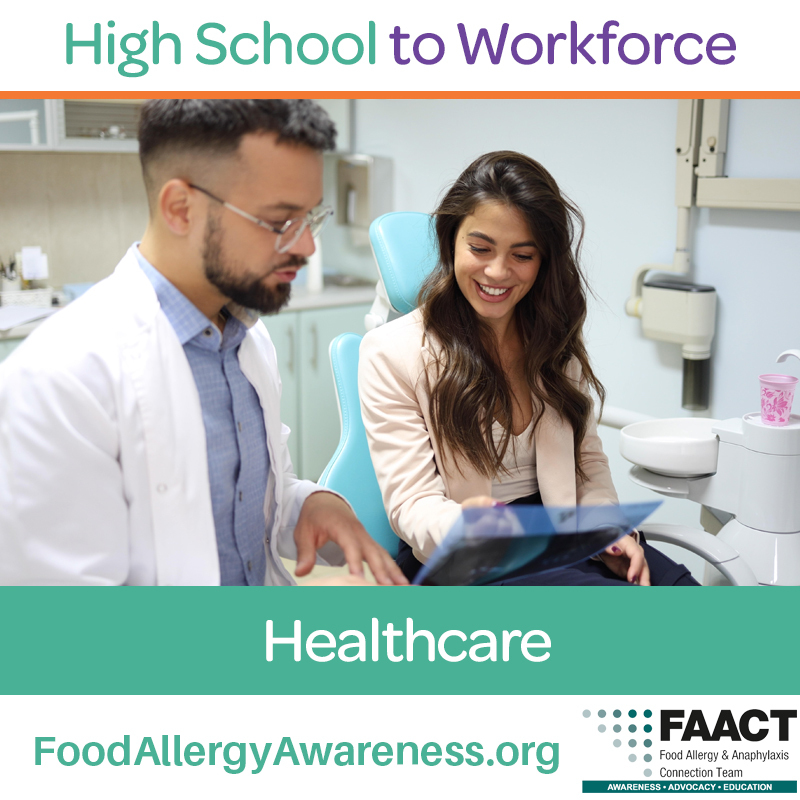
Healthcare
- Ask your parents/caregivers if you will remain on their health insurance or accept your work’s plan if they offer one. Get an up-to-date insurance card.
-
TIP: Keep a front and back photo of the insurance card on your phone.
-
- Locate a local board-certified allergist if you moved to a new area.
- Ask for recommendations from your current allergist and ask your parents or caregiver to help you find a local provider.
- If you participate in OIT, SLIT, or other food allergy treatments that need to continue, speak to your doctor ASAP about how treatment will continue if you have to change allergist offices.
- A new allergist will likely want to review your current allergist’s records so they are fully in the know about your medical history. Once you find a new allergist, ask them about the process for sharing medical records with them.
- If you are staying in your current area, as an adult, you are now the main contact for your appointments and treatment needs. Get ready!
- If you changed insurance plans, you’ll need to provide that new insurance information to your doctors and pharmacy.
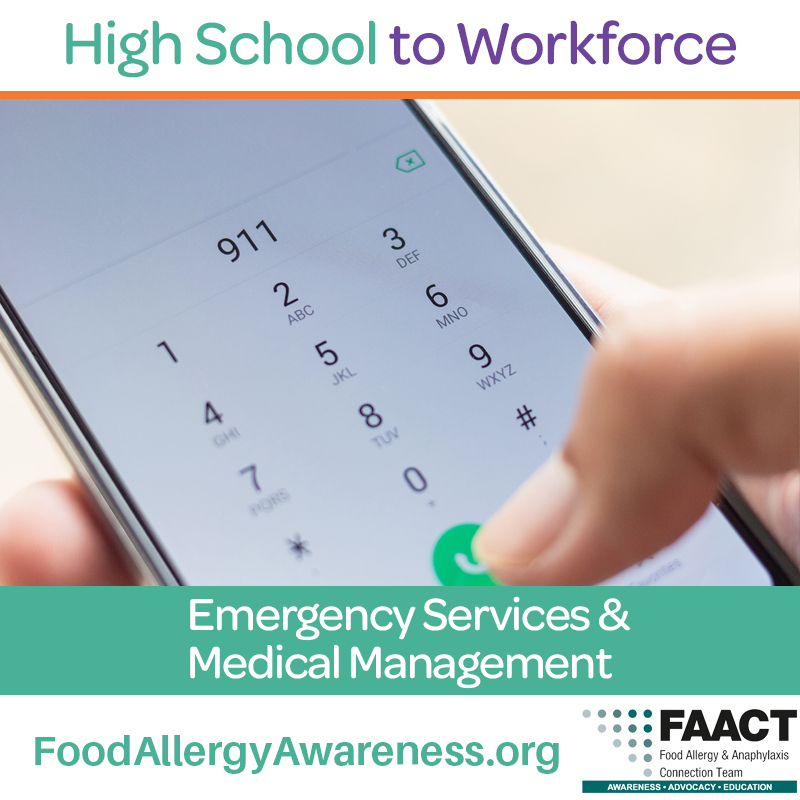
Emergency Services and Medical Management
Managing food allergies includes two critical steps: reducing your risk by taking steps each day to prevent an allergic reaction and being ready to take swift action if a reaction occurs.
- Learn how medical emergencies are handled at your company/job site.
- Does someone call 911 or is there security/medical assistance onsite who should be called first?
- How long does it take to get help?
- Does your office stock emergency epinephrine? If so, who is authorized to administer it?
- Who will assist you if you experience an allergic reaction at work?
- Is emergency medical care close to the workplace? Are there local hospitals with functioning Emergency Departments?
- Medical Identification jewelry speaks for you in the event you are not able to communicate. Emergency responders are trained to look for medical IDs. Various ID products offer contact data that helps EMS learn about your health, gain access to your medical information, and contact your loved ones.
- Although wearing a medical bracelet or necklace may not have crossed your mind, you will be grateful for the support in the event of a medical emergency.
- There are many varieties and styles available. Medic Alert has partnered with FAACT to offer a 20% discount for new subscriptions. Use code FAACT20.

Technology
Many young people enjoy using apps to help them manage their lives. Families rely on apps to help them stay connected and manage health conditions, including food allergies. Explore apps to help you keep track of epinephrine expiration dates, manage your health, or find potentially safe eateries.
NOTE: FAACT does not endorse these apps, but we are sharing them to provide you with examples of what some FAACT families are using right now.
- AllerTrain™/FAACT: Map of colleges/universities food service departments that have been trained.
- MenuTrinfo® Kitchens with Confidence™ Program: which certifies food service locations that have been assessed through rigorous audits on methods, standards, policies, and understanding to serve persons with special dietary needs, specifically food allergies. A map of certified locations available on the AllerTrain™ website is a useful tool for students going to college with food allergies.
- Allergy Force: Food Allergy Management
- Allergy Eats: Food Allergy Friendly Restaurant Guide
- Headspace: Meditation and Sleep App (family subscription)
- AirNow: Air Quality App
- Life360: Family Safety App
- American Automobile Association (AAA): Mobile Roadside Assistance Service and Travel Discounts
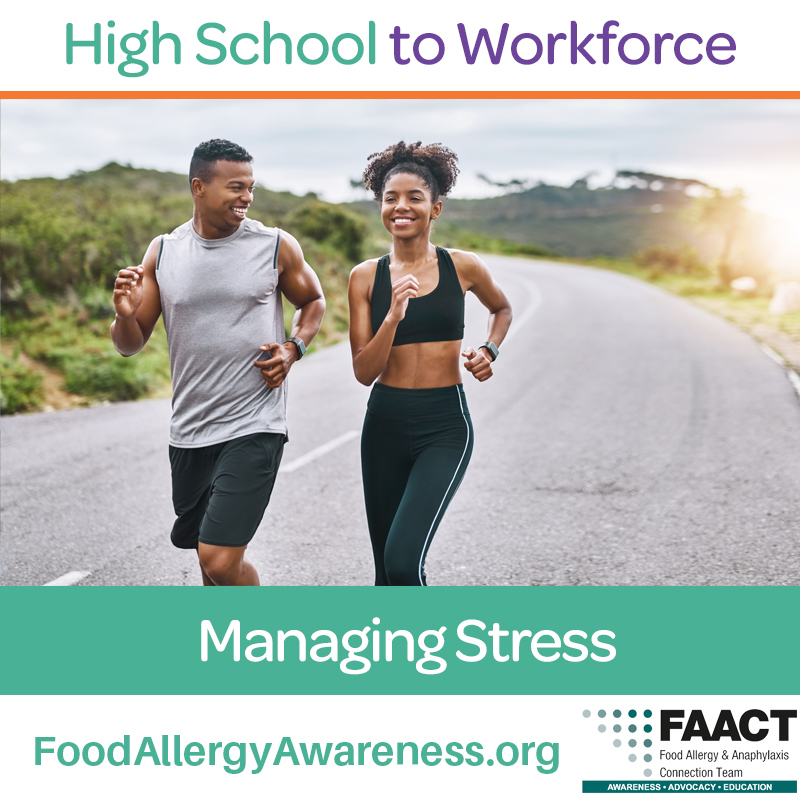
Managing Stress
- Make time for yourself.
- Making money can be exciting! As a new employee, you can get lost in the desire to make as much money as possible by taking on more hours (if you are paid hourly) or feel like you need to impress the boss by working a lot of extra hours.
- Make sure you are still making time to do what makes you happy (whatever that is!). Do at least one thing that you love every day, whether it’s reading a book, going for a run, watching cat videos, or something else entirely.
- Keep an agenda.
- Agendas are not just for high school. Keeping a planner, whether it is digital or physical, will help you stay on track in terms of appointments and other life commitments.
- Create a work/life balance.
- Being committed to work is important. Arriving on time and accomplishing your tasks will make you successful. But balancing the right amount of work with your social life, family life, and taking care of yourself will keep you happy, healthy, and able to do your best work.
- Make sure the people you regularly spend time with know about your food allergies in detail, especially your immediate boss and co-workers, including where you carry auto-injectable epinephrine and if you’re wearing a medical ID tag.
- Consider speaking with a therapist about skills for managing stress and anxiety at work. These are normal feelings, and there are great tools available that will help you your entire life!
- Visit FAACT's Behavioral Health Resource Center for more tips on managing stress and maintaining mental health.
Working and thinking about college, as well? For more resources, visit FAACT's College Resource Center
Confidence is key! Own it!

